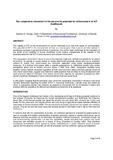The cooperative movement in Kenya and its potential for enhancement of ICTlivelihoods
Abstract
The viability of ICT for the enhancement of human livelihoods is an idea that needs no overemphasis.
The potential of ICT in the improvement of lives is a human-given that is yet to be fully realized in
developing countries in general and Kenya in particular. One of the major challenges to the realization of
the power of ICT potential in human livelihoods is the relative unawareness of the majority of the
populace about the role ICT in socio-economic and cultural environment.
The cooperative movement in Kenya is one of the nationally organized institutions available for all cadres
of persons. Its agenda is usually based on locally determined proposals whose aims are to empower
citizens to realize their socio-cultural and economic capacities using locally available/generated
resources. It is believed that people within a specific geographical or institutional locality have similar
perceptions about how to resolve common issues in their lives. Often, cooperative societies bring
together various classes of people regardless of their socio-economic status and their agenda would be
one only-to share ideas, suggest and implement viable practices that are likely to bring development and
uplift economic status of members. The various forums they organize for education purposes are often
devoid of political, ideological or socio-cultural emotivism that may derail focus.
In this paper I suggest that the principles upon which the cooperative movement in Kenya is built could
harness awareness regarding the power of ICT in improving livelihoods. I identify ways and means by
which a cooperative society may enhance its capacity to incorporate ICT for livelihoods in theory and
practice within its operations for efficient and effective achievement of its objectives.
Collections
- School Of Education [18]

